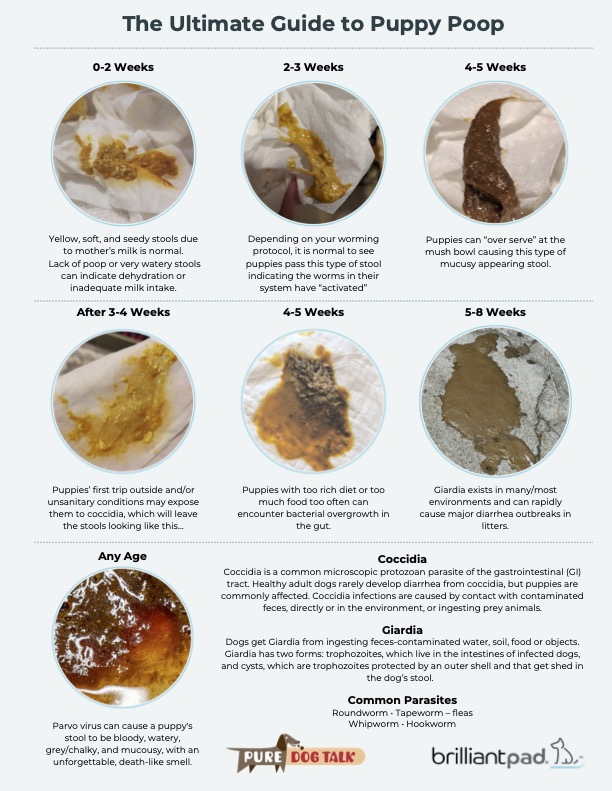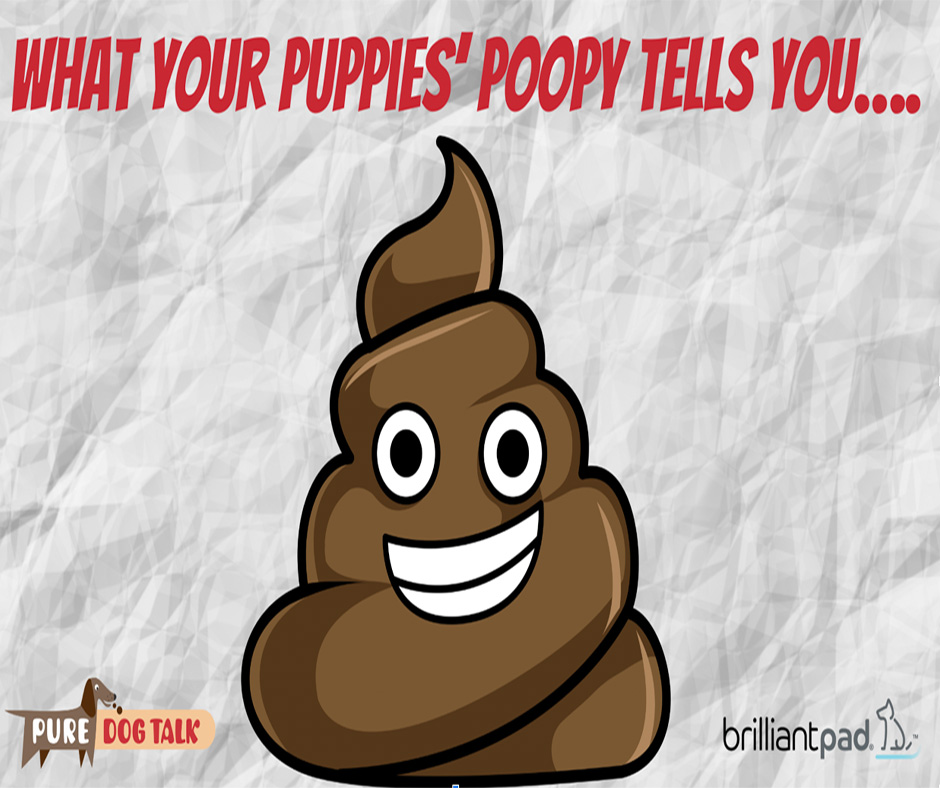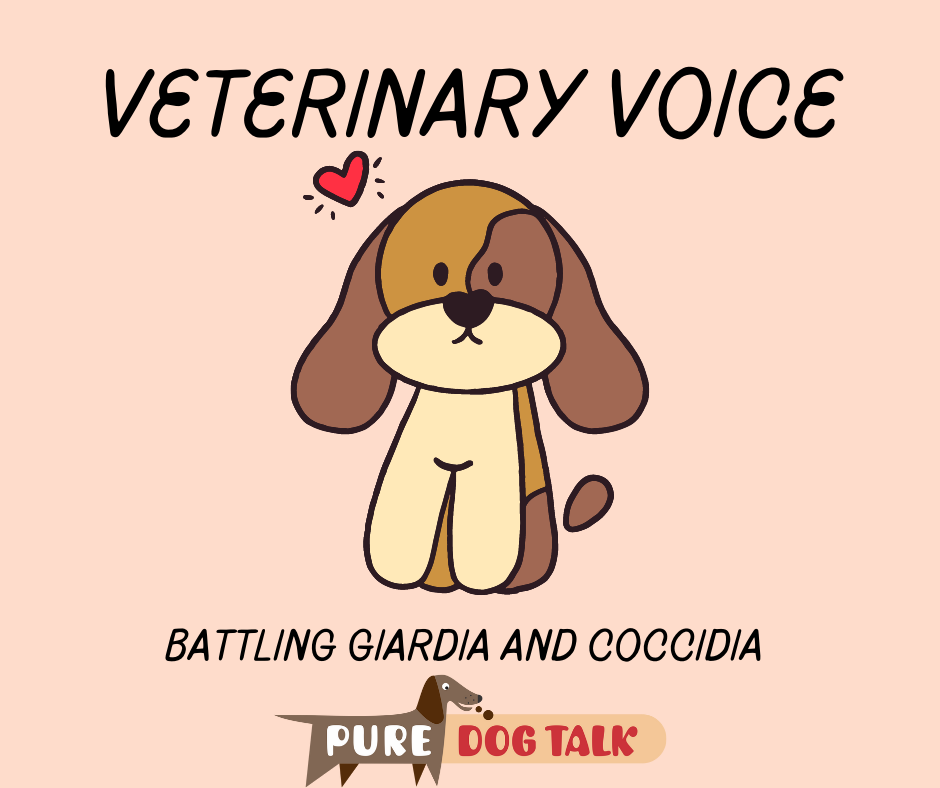637 – What Your Puppies’ Poopy Tells You
What Your Puppies’ Poopy Tells You
Dr. Marty Greer, DVM joins host Laura Reeves for an extended conversation about puppy poopy. Color, consistency, contents and coating of the puppy’s stool give detailed information about its gut health. They also discuss prevention and treatment of common intestinal upset.
“A yellow, softened, seedy stool is absolutely normal (for the first two weeks),” Greer said. “It’s not that they’ve eaten anything that shouldn’t be in there. That’s just normal milk curd being digested and the normal color with the digestive enzymes.”

Puppy stool samples and what they tell you, at a glance.
To watch the entire presentation, with photos, click the link HERE.
Intestinal parasites
“If a bitch ever had roundworms when she was a puppy or ever had hookworms when she was a puppy, those will encyst in her muscles and they will reactivate during the stress of pregnancy and lactation and migrate,” Greer said.
“Roundworms migrate through the placenta into the puppies. So, this is how puppies are born with intestinal parasites, is they’re already born with them before they are hatched, they come out, and hookworms will migrate through the milk and into the puppies.
“So this is how we end up with parasites that are going to cause problems in puppies. And they typically will start to become an issue when the puppies are right about three weeks of age. So just three to four weeks, just about the time you’re starting to wean, about the time you’re trying to get them on to solid food, they get sick, they feel puny, they have a belly ache, they don’t feel good, you end up going to the vet.
“Sometimes those stool samples are negative even if the parasites are there because the parasites need to be at least three weeks old to produce the eggs that it takes for them to see under the microscope.”
Worming pregnant dams with Fenbendazole (Pancur) is the only guaranteed way to raised puppies not born with intestinal parasites.
“So Panacur, you start at day 42 of the pregnancy,” Greer said. “And you give the dewormer every single day from day 42 of the pregnancy until the puppies are 14 days old. That is five weeks. The label says three days, and I understand the label says three days, but it is a five -week protocol. It is an off -label use, technically, but I can say that because I’m a veterinarian and I’m allowed to say those things. This protocol was published for the first time in the early 1980s.
“We’re giving 50 milligrams per kilogram once a day (to the dam for five weeks). If you give the suspension, not the tube paste, but the suspension, the liquid stuff that you shake up. That’s given at one cc per four pounds of body weight. Safeguard, Panacur, fenbendazole is all the same thing. So if it’s a 10 % solution, it’s one cc per four pounds of body weight. Or you can use the granules. Now granules come in little packages, but they also come in a one pound tub, so there are very cost effective ways for you to get this. I’ll tell you the bitches don’t like the medication given daily, but you know what? I don’t like worms in my washing machine and in my puppies, so I’m going with, I’d rather deworm the bitch.”
515 — Doing Battle Against Giardia and Coccidia
Doing Battle Against Giardia and Coccidia
Dr. Marty Greer, DVM joins host Laura Reeves to discuss how breeders and dog owners in general can do battle against the dreaded “bad potty bugs,” giardia and coccidia.
These single cell organisms can become endemic, Greer notes.
“You can’t get rid of it (on your property),” Greer said. “And that’s the bad news. There’s no really great treatment for either of them. There’s nothing you can do that’s going to disinfect your way out of it. We can’t vaccinate our way out of it. So we need to talk about all of our options.
“Many of the organisms that we see in the GI tract, whether it’s Giardia or coccidia or parvo, or tonight I got a text message from a lady in Florida about campylobacter, many of those are secondary to something else.
“So good gut health in general is your best defense. That’s really the primary backbone of what you can do. So that means a diet that’s appropriate, that doesn’t cause your dog to have diarrhea or loose stools. A probiotic that’s appropriate to keep the right bacteria there. Making sure you vaccinate for all the things you can vaccinate against, such as parvo. And making sure that you get regular fecal analysis done.
“One of the best defenses you have right now are the monthly heartworm preventives that you give orally… will give you better gut health because it controls intestinal parasites such as roundworms, hookworms and whip worms. So the fewer other things your dog’s body has to deal with, the healthier the gut, the better the dog’s overall health is going to be.
“The most commonly affected dogs that get sick are gonna be the younger ones or the dogs that are immunocompromised. So in general, if your dog has a little loose stool but they’re feeling OK, they’re eating OK, they’re not vomiting, everything is OK other than their stools are intermittently or consistently loose, you take a stool sample in to your vet and ask if they can send it to a reference lab if they can’t do Giardia testing.
“Treatment for coccidia is Albon. Number one, you have to weigh (your dog) so your dose is accurate. Number two, if you’re using the liquid, you have to shake it up really well because it does settle out.
“Treatment of Giardia, there is no labeled drug for use in the United States, but there are a couple that are commonly used and very effective. Metronidazole, fenbendazole (Do not use metronidazole on puppies that are very young or pregnant bitches) Panacur, Safeguard, those are fine.”


